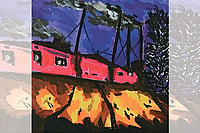In the closing pages of his book, Mihir Bose tells the story of being taken by a publicist to meet Karan Johar. The publicist, we’re told, was a young and pretty female. Upon hearing that Bose was writing a history of Bollywood, she asked him, "What is your angle?"
Bose reports, "When I said it was just a narrative history, she looked vacant." I’ve just finished reading Bollywood: A History, and I’m not at all looking vacant. In fact, almost from page one, I have maintained a fixed look of irritation.
There will be some that will say that this so-called history holds the proper mirror to its subject. After all, the book is shallow, derivative, too long, and insufferably tedious.
But such judgement would be unduly cynical. Hindi films differ enormously from each other. Countless wretched movies have been made, of course, and, through the ages, also many brilliant ones. The existence and growth of Hindi films across nearly a century doesn’t lend itself to easy generalisation.
The same cannot be said of Bollywood: A History. It is uninspired and unoriginal on nearly every page.
The book comes with the claim that it is "the first comprehensive history of India’s film industry that now rivals Hollywood". (Insert vacant look here.) Surely any history should have a point, no? And a comprehensive one might even be expected to deliver an especially complex or rich one. However, you’d be hard-pressed to find a single coherent or cogent argument about Hindi cinema in Bose’s book.
Although you will learn that Kishore Kumar’s marriage to Yogita Bali lasted only a month because he refused to share his bathroom with her, you won’t find out much about why Bollywood: A History got written or why it was necessary. (Or, wasn’t it?)
If a thesis of sorts emerges, it is that chance plays a big part in our film industry. K.L. Saigal had a sore throat, and because he decided to sing for Devdas in a quiet tone, a singing style was born that spread all over India. If Dilip Kumar hadn’t needed to buy fruit in Nainital, he wouldn’t have met producer Devika Rani, and there would have been no great actor. Balraj Sahni saw that his bus conductor was a real clown, and thereby Badruddin Jamaluddin Qazi became the comedian Johnny Walker.
Great stuff. If you were compiling a textbook of trivia.
The glimmers of light come mainly in the form of frequent and lengthy quotations from Shyam Benegal. (At one point, a description of the famous director begins in the following manner: "It would have been easy for Benegal to have chips on his shoulders like banyan trees....") Shyambabu isn’t the only one thus exploited. The amount of borrowing from other published sources, as in the chapter on Sholay (Anupama Chopra), on Lagaan (Sanjay Bhatkal, and Chris England), and in earlier chapters on the films of the ’40s and ’50s (Saadat Hasan Manto and others), is embarrassing for the reader if not the writer.
I can’t help but feel that the book was badly conceived. Bose writes that he was returning to Mumbai to research this book after nearly 40 years. He would have been better off writing a personal account of his nostalgia for the old films and his distance from everything that was new. An example of a partial, as opposed to comprehensive, history is Jerry Pinto’s Helen: The Life and Times of an H-Bomb. In such a history the writing can be engaged, sharp, and entertaining. Instead, Bose’s misplaced ambition leads to a tale that rivals in its rambling, self-congratulatory tone the meandering talk of a bar bore.
If there were other faults in the book, they escaped my attention because I was often distracted by the author’s inventive language and punctuation. Here’s one which I quote somewhat unfairly because not all the sentences in the book imitate its remarkable syntax: "But while in was in jail Gandhi, observed a fast, and Yusuf, refused to eat the prison breakfast." Some further words on the subject of language. Presumably because this book was first published in the UK, where Bose lives, we get unedifying phrases like "pans, betel nuts wrapped in a leaf Indians love to chew". But for more mysterious reasons, the author can’t resist inserting an "h" in unexpected places, as in "Raj Bhabbar", "How to be a Crorepathi", "Hindusthan", "Mother Theresa", "Smitha Patil", "Khetan Mehta", etc. Like Bose, I could go on and on.
***
Also See: Mihir Bose's Response: Read, Only Then Write
(Amitava Kumar’s novel, Home Products, was published last month by Picador-India.)


























